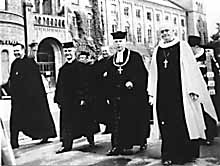






Assembly
History
Assemblies,
considered milestones for,
Previous Assemblies and Themes
1947 Lund, Sweden, The Lutheran Church in the World Today
1952 Hanover, Germany, The Living Word in a Responsible Church The Second Assembly was held in Hanover, Federal Republic of Germany, July 25 to August 3, 1952. The Assembly met in a city that was marked by World War II; practically the entire old city had been destroyed and only some of the ruins had been cleared away. It was manifest, however, that there had long been a will to reconstruct. For Germany, the meeting was significant because it was the first time that a large international organization met in Germany and elected a German to be its president. This Assembly strengthened the LWF as an organization. New ways for participation for laypeople who wanted to take on responsibility was reflected in adding four lay positions to the Executive Committee. It was also decided that youth delegates were to have a voice and vote in the Assembly in the future. Departments of Theology, World Service and World Missions were established. (TOP) 1957 Minneapolis, USA, Christ Frees and Unites
The Third Assembly was held in Minneapolis, Minnesota, August 15 to 25, 1957. There were 145 delegates from Europe especially from Germany (67) and from Scandinavia (48); 60 from North America; 16 from Asia; 7 from Latin America and 5 from Africa. In spite of visa problems, several delegates from Eastern Europe participated. The period was marked by a sense of optimism about the future of institutional religion. Newly emerging nations in Africa struggled to overcome the burden of colonialism; Christians in Asia faced political opposition; and the "cold war" between East and West kept Lutherans divided in Europe. (TOP) 1963 Helsinki, Finland, Christ Today The Fourth Assembly was held in Helsinki, Finland, July 30 to August 11, 1963. Communication between countries and continents was increasingly close and quick. Technical progress was praised. The LWF had installed a broadcasting service, Radio Voice of the Gospel, in Ethiopia. It was a time of ecumenical breakthroughs such as the Second Vatican Council. The Assembly established the Lutheran Foundation for Interconfessional Research which gave rise to the Institute for Ecumenical Research in Strasbourg, France. At the same time, the Assembly was unable to agree on how to express the doctrine of justification in ways that were relevant for "people of today." (TOP) 1970 Evian, France, Sent into the World The Fifth Assembly is considered to have had a greater impact on the development of the Federation than any previous or subsequent Assembly. An attempt to hold it at Weimar, German Democratic Republic, was denied by the East German government. It was then decided to hold it in Porto Alegre, Brazil, which would have made it the first Assembly to be held in the Third World. However protests about the violation of human rights in Brazil caused the Assembly to be moved to Evian, France, July 14 to 24, 1970, a decision made only five weeks before the Assembly was to meet. Youth delegates made their presence felt throughout, demanding changes in the rules of procedure and challenging traditional ways of doing things. The Assembly adopted a new LWF structure, passed a resolution on human rights, and recommended pulpit and altar fellowship between LWF member churches. (TOP) 1977 Dar es Salaam, Tanzania, In Christ A New Community The Sixth Assembly was held in Dar es Salaam, Tanzania, June 13 to 25, 1977, the first time an Assembly was held in Africa and in the Third World. Issues faced by African churches on their own continent came to the fore. A statement on "Southern Africa: Confessional Integrity" declared that the racial separation of the church in compliance with apartheid in Southern Africa constitutes a "status confessionis" (a basis in faith for churches to reject apartheid publicly and unequivocally). The statement, "A Challenge to the Churches," summarized a Lutheran view on mission, witness and global partnerships in mission. The Assembly endorsed the establishment of a Youth Desk and asked the Executive Committee to establish a full-time Womens Desk. (TOP) 1984 Budapest, Hungary, In Christ Hope for the World
The Seventh Assembly was held in Budapest, Hungary, July 22 to August 5, 1984. This was the first LWF Assembly, and the first meeting of a major international Christian organization, to be held in what has sometimes been called the "Second World," the countries of Central and Eastern Europe that were then living under Communist rule. The Assembly suspended the membership of two white churches from South Africa on the basis of their continued support of the system of apartheid and their failure to end the division of their churches on racial grounds. A constitutional change affirmed that all member churches now understood themselves to be in pulpit and altar fellowship. The Assembly resolved that a plan be developed so that by the Ninth Assembly women would regularly comprise 50 percent of Assembly delegates. (TOP) 1990 Curitiba, Brazil, I Have Heard the Cry of My People The Eighth Assembly met in Curitiba, Brazil, January 29 to February 8, 1990, the first and long-awaited Assembly for Latin America. It was a time of extraordinary international change marked by the fall of the Berlin Wall and the breakup of the Soviet Union. While the Assembly was preoccupied with restructuring the LWF, the significant constitutional change was made to affirm our self-understanding as a "communion of churches." Membership on the LWF Council would be divided evenly between representatives of member churches in the Southern and Northern hemispheres. The Assembly also set a goal of full communion between the Lutheran and Anglican traditions. (TOP) 1997 Hong Kong, China, In Christ Called to Witness The Ninth Assembly met in Hong Kong, China, July 8 to 16, 1997, one week after the British authorities had handed Hong Kong back to China. It was the first such Lutheran global meeting in Asia and considerable attention was focused on the celebration of the fiftieth anniversary of the LWF. It set a process in motion for the acceptance by member churches of the Joint Declaration on the Doctrine of Justification between the LWF and the Roman Catholic Church. For the first time, close to 50 percent of the delegates were women. While the Assembly reaffirmed the commitment to women's ordination, as an expression of the communion of all baptized in Christ in giving witness to the gospel, it avoided confrontation on the matter by supporting the reflection and dialogue of the member churches on the issue in a spirit of love and mutual respect. (TOP) Information gleaned from: [Site Map] [LWF Assembly Home] [Links] [LWF Home] |

|



